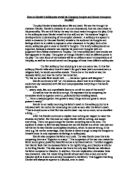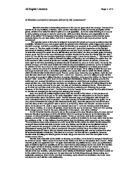Textual Integrity in Hamlet
Textual Integrity in Hamlet In order to decide if the textual integrity is essential to the play, one would examine whether the character motivations remain constant with the rest of the other characters present within the play. Their imagery, motives, word choice, and whether the speech seems to fit with Hamlet's overall character. Due to the different contexts of the play (one being the Elizabethan era whilst the other being the present) it is easily arguable from a Elizabethan era viewpoint that the character of Hamlet has done the morally correct thing to society as he has waited to the right moment (when he is aware of Claudius' true actions) to act upon his vengeance for his father. Hamlet has maintained his duty to family and God by not killing himself due to loathing but evening the scores in order to regain his father's worth. On the other hand from a modern day approach the audience feels as though Hamlet should react straight away and kill Claudius. The idea of duty to God/religion has become mildly ethereal and is not as apparent as it was during the Elizabethan era. One interpretation of "Hamlet" is the play is about suicide. The play heart is an concentrated psychodrama that is about a prince gone mad from external pressures. He longs for the ultimate release of killing himself for several different motives depending on the situation. When Hamlet has the
Interpretations of Hamlet
Write about the many different interpretations of Hamlet. Over the years many differing interpretations of hamlet have come to the forefront. The audiences over time have experienced immense themes with deep internal and external meaning. It is apparent that over time all relevance has remained the same and thus allowed the creation and recreation of 'Hamlet' to remain as relevant as it was in the Elizabethan era. The different interpretations have allowed 'Hamlet' to survive the test of time with differing perspectives forming new ideas that are prevalent in the tragedy of 'Hamlet'. There are many different 'Hamlet's' all with there own personal meanings and interpretations. In this entry I will be outlining the main interpretations that have thrust interest upon me and thus the reason I will be outlining them with contrast to the original play of 'Hamlet'. The easiest and most widespread interpretation of the play is to view the character of Hamlet as a victim of external pressures, faltering to his own internal desires. Hamlet's tragedy is not a result of his believed weakness or flaw or even his mistakes in regards to judgment and action but ultimately the intolerable situation which has been thrust upon him - the situation of a murderous uncle. With the murder of his father apparent and the hasty re-marriage of his mother to his enemy, Hamlet is unable to turn to
Hamlet Act 5 scene 2
The most dramatic scene in Hamlet for me was definitely Act 5 scene 2, which is also the last scene in the play. There is a lot that happens in this scene and it ties up all the loose ends at once in a very well written and exciting fashion. Shakespeare brings everything to an end in a way where you can't help but want more. Six out seven of the deaths that occur in Hamlet (if you include Guildenstern and Rosencrantz) happen within less than four hundred lines of each other so it is a very action packed scene as well. The scene opens with Hamlet confessing his plans to Horatio about how he escapesd death in England and returned and how he has left a letter that will cause the death of Rosencrantz and Guildenstern but he does not show remorse, as they were more than happy to bring him to his death because the king told him to."They are not near my conscience. Their defeat does by their own insinutation grow" The idea that Hamlet would cunningly switch the letters so that they would die would make this scene exciting enough on its own but this is only the beginning and in comparison to the other things that happen this is nothing. Hamlet does, however, ask if he is justified in killing his uncle considering all the things he has done and tried to do. "Is't not perfect conscience to quit him with this arm?" Hamlet causes a scene when he makes Osric (a courtier) remove and
What are your first impressions on Hamlet in Act I scene II?
What are your first impressions on Hamlet in Act I scene II? The first impressions on Hamlet vary with the audience, as some people see him as a misanthropic character, whereas others see him as a character of dignity, intelligence and sensitivity, also someone beyond his time. The atmosphere he provides though is very distressing, not only towards the audience but towards the characters, especially his rival Claudius. He can be seen as someone who separates the idea of reality and appearance. Everyone sets the allegiance towards Claudius their king, except Hamlet, when everyone has removed their mourning clothes except Hamlet, who is still wearing his "nighted colour," and Gertrude asks "Why seems it so particular with thee?" Hamlet responds to her question by using the word "seems", which Shakespeare used to represent appearances, and Hamlet says it twice in a single sentence, and he says he cannot pretend, but rather, must be what he is. Shakespeare might have intended to use "seems", because the idea of appearances is important, as I mentioned, but to show how Claudius might be the antagonist. His mood shows how misanthropic he can be, but also can be seen as sensitive by other people, as he has taken the 'forms, moods, shapes of grief' which are true for him. Though his emotions may seem to be those of an actor due to Gertrude's viewpoint, he is not acting at all,
How do Hamlet's Soliloquies reveal his Changing thoughts and Moods throughout the play?
How do Hamlet's Soliloquies reveal his Changing thoughts and Moods throughout the play? The play Hamlet is basically about life and death. We see this through the character Hamlet. Hamlet's character is not one dimensional, their are many sides to his personality. We can tell this by the way his mood varies throughout the play. Only in the soliloquies does Hamlet reveal his true self, and we 'the audience' begin to develop a better understanding of his complex character. A soliloquy is a speech in which a character (in this case Hamlet) reveals to the audience his thoughts and feelings which he is unable to express to other characters in the play. So in other words, soliloquies give a voice to Hamlet's thoughts. This is why soliloquies are so important, because a character can express his most inner thoughts with out judgement from fellow characters in the play. The three soliloquies I have studies are like signposts in the play. They guide us through Hamlet's mind at different points in the play. The main focus of my analysis will be on different actor's interpretations of this play, as well as the actual content and language of these three different soliloquies. The first soliloquy I am studying is in act one scene two. In this first soliloquy Hamlet talks about how if it wasn't for god's laws (sixth commandment, a religious law), he would committee suicide. This is due to
Discussing dramatic devices in Hamlet.
Hamlet In Shakespeare's play "Hamlet" there is a lot of dramatic devices. This causes tension because the guards of the Norwegian royal family are very jumpy as they think there might be another attack. However young Hamlet is going to avenge the death of his farther. Then tragedy strikes when everyone dies. A heavy dark atmosphere is established at the start of act one, scene one. By using, questions such as "Who's there?" Gives the impression that the guards are cautious, and scared. Also, "You come most carefully upon your hour." This implies that Bernardo came quite quietly and discreetly, and that Francisco is scared. This makes you wonder why they are scared, is there going to be another war? Why are they being careful? This draws in the audience and makes them ask questions. Elizabethan audiences strongly believed in ghosts, so by taking advantage of this, Shakespeare has used certain techniques to introduce a ghost. This would engage the audience because they would strongly believe. Also the use of the word "thing" in act one, scene one gives the impression that they don't know what the ghost is. For example when Marcellus says "what has this thing appear'd again to-night?" This tells us that he is scared; however he isn't aware of what he is scared of. Marcellus also refers to the "dreaded sight" this is a form of emotive language because the sight he is seeing is















